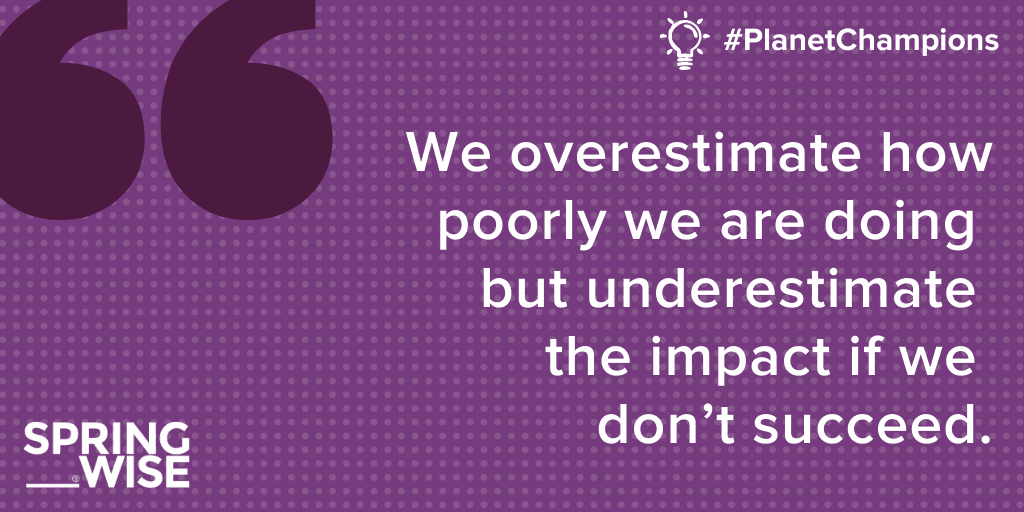We sat down with the award-winning climate reporter Akshat Rathi to get a peep behind the curtain of his popular podcast, and came away with three lessons for effective climate communication.
Akshat Rathi is a senior climate reporter at Bloomberg News and the presenter of the organisation’s climate podcast, Zero: The Climate Race, where he discusses the challenges and opportunities on the road to net zero with CEOs, founders and climate tech entrepreneurs, politicians, and heads of international organisations. He is also the author of Climate Capitalism: Winning the Global Race to Zero Emissions. In the current environment, where disinformation is rife and audiences are growing tired of ‘green’ messaging, it’s a challenge for individuals and companies trying to make a positive impact on the planet to be heard – but not impossible if you bear three key things in mind.
1. Getting climate communication right means knowing your subject
As well as a host of awards for his journalism, Akshat Rathi holds a PhD in organic chemistry from the University of Oxford, so he has a grip on how carbon-containing compounds behave. Journalism allows him to share knowledge and bring complex concepts to life for others. “I like to see things as they are and understand them,” he says. “It’s not my job to tell people what to do, but climate communication is important.”
Not least to counter the pervading ‘doomsday narrative’ that dominates discourse around climate change. “We overestimate how poorly we are doing but underestimate the impact if we don’t succeed.”

Negative messaging has an impact. A recent study by Euromonitor International found that “[Consumers] are tuning out messages that place the burden on their behaviour. Instead, they want organisations to step up and show proof of their eco pledges.” More broadly, the 2024 findings of the annual Edelman Trust Barometer show a worrying decline in trust in public institutions, including government and the media, with CEOs most trusted – but only just – to lead on bringing innovation to society. In terms of the case for climate action, Akshat regularly meets CEOs, politicians, and heads of international organisations, who all understand the need for change but whose organisations don’t seem to be engaged in any kind of action.
“The individuals who stand out are the ones who can articulate why things haven’t moved, point to the barriers, and show what they are doing to overcome those. Once you are at the level of CEO, you are typically doing all sorts of things and climate is just one part of it. A good test if someone actually cares about the climate is if they can talk to a climate reporter about their grasp of the subject and if they are able to articulate beyond the talking points a comms person has given them.”

2. Candour cuts through
It’s worth noting that if a CEO has made it onto the Zero podcast, they know their stuff. “I weed out the ones who don’t.” Outside of senior executives, Akshat has notched up an impressive list of interviewees – recent episodes feature the hedge fund billionaire Tom Steyer and the former Executive Secretary of the United Nations Framework Convention on Climate Change Christiana Figueres. And while at COP28 in Dubai, former US Vice President Al Gore stepped up to the plate and managed to surprise his host with his honesty.
“He’s the big guy – Al Gore has been in the game of communicating climate stuff since forever and I’m usually a little reticent about an interview with someone if they already have a platform. But then he dropped a bomb and had a huge rant against big oil which hadn’t happened for a while.”
Ahead of the COP28 summit, Al Gore did not hold back his criticism of the decision to host the event in the United Arab Emirates and led Akshat to feel that he might have even more to say. “So, it felt like good timing to speak with him and we ended up getting him to talk about how he wants to move away from the required UN consensus on decision-making at COP summits and how he is working on that.”
3. Talk about the problems and the solutions
Akshat’s recent book, Climate Capitalism, considers the climate emergency through the stories of 10 individuals who have proved that the “green economy is not just possible, but profitable”. The roll call of those featured in the book includes Wan Gang, former Minister for Science and Technology in China and founder of the country’s EV industry; CEO of Occidential Petroleum Vicki Hollub; Executive Director of the International Energy Agency Fatih Birol; and philanthropist and former CEO of Microsoft Bill Gates. Each story illustrates either the innovations pioneered by these people, or the strategies they have implemented that have already had a tangible impact on emissions. As he says in the book, “Our age will be defined by the climate emergency. But contrary to the doomist narrative that’s taken hold, the world has already begun deploying the solutions needed to deal with it.”

Akshat’s takeaways from davos
When we spoke, Akshat had recently returned from The World Economic Forum (WEF) annual meeting in Davos. “Climate is still on people’s minds, but it’s down on the priority list, which is understandable given the political situation. There was a lot of conversation around co-benefits in order to keep climate a priority, such as how can you combine health and climate, or energy costs and climate.
“One key announcement came via the WEF and the consultancy Bain regarding the First Movers Coalition, which started off focused on hard-to-abate sectors, such as steel and aviation, and is going to expand into food, nature, agriculture, and green procurement for regenerative agriculture products.”
Find Zero: The Climate Race on Apple podcasts, Spotify or wherever you usually listen. To order a copy of Climate Capitalism, which is out now, follow this https://akshatrathi.com/book.

